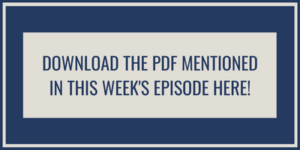 Have you considered that hunger serves as a valuable tool for our bodies, playing a crucial role in the weight loss process and keeping the weight off? In today’s discussion, we’ll delve into the significance of hunger, exploring how we can harness it as a beneficial tool while striving to shed pounds and why it’s actually a good thing to be feeling.
Have you considered that hunger serves as a valuable tool for our bodies, playing a crucial role in the weight loss process and keeping the weight off? In today’s discussion, we’ll delve into the significance of hunger, exploring how we can harness it as a beneficial tool while striving to shed pounds and why it’s actually a good thing to be feeling.
Additionally, we’ll explore the hereditary aspects of hunger and how prior experiences of food scarcity can influence our relationship with food. Developing specific eating habits is common, underscoring the importance of comprehending our hunger signals. If you find yourself experiencing anxiety about hunger, that’s perfectly normal! Today, we’ll address ways to overcome that fear. Recognizing our history and its impact on our eating patterns can be immensely beneficial in the journey toward weight loss. Let’s dive in!
If you are ready to lose weight and change the way you think about hunger, sign up for the lifetime access membership for Love Yourself Thin! Doors are open and you can find all the information by clicking here.
What You’ll Learn from this Episode:
- Hunger can be a useful tool for our bodies
- Food scarcity and food insecurity can be generational and passed on.
- Why feeling hunger is a good thing.
Listen to the Full Episode:
Featured on the Show:
- If you are ready to lose weight and change the way you think, sign up for the lifetime access membership for Love Yourself Thin! Doors are open and you can find all the information by clicking here.
- Leave me a review in Apple
Full Episode Transcript:
134. Weight Loss and the Hunger Games
Have you read the books, the Hunger games? So recently a new one has come out the movies at Hunger games, and today’s episode, I’m actually going to be talking about hunger and how important hunger is in the process of losing the extra weight that we’re carrying on our bodies and keeping it off for good. My name is Dara Tomasson and this is Love Yourself Thin podcast, episode one thirty-four, Weight Loss and the Hunger Games.
Hello everybody. All right, so if you haven’t watched the Hunger games, it’s this kind of crazy story about Katniss Everdeen and they live in this utopian society where they had these different factions and they were of course trying to say, you know, we’re all gonna be equal. It’s like a form of kind of, I guess, communism in a sense. And this group you’ll work on planting cotton and these things, and you this group of people are doing fishing and, you know, all these different areas. And of course there’s the one group that are their elite and everything’s better. And, and then once a year they have these hunger games where they send two kids from every area and they literally like fight to the death. It’s, it’s terrible, but it was very popular and very interesting. And there’s like a whole love triangle.
Anyways, I’m thinking about the actual Hunger Games that we all play in our own lives, and we know how it is, we walk through the kitchen and we’re like, oh, come on, I’m kind of hungry. It kind of looks yummy. And so today we’re going to talk about hunger as a tool, and we’re going to talk about our DNA, our chemistry and our mindset and how the science works to help hunger be such an amazing tool for us that we’re actually going to be exploring within Love Yourself Thin in the month of March. And so I’m going to invite you to check out Love Yourself Thin so you can take the deep dive with us into hunger for the month of March, 2024.
All right, so before we go into this episode where we go into these tools, I wanted to talk about the ripple effects of how other people, how their lives are impacted by the Love Yourself Thin tools and when the members of Love Yourself Thin show up and how different their lives are because of the work that they’re doing. So one of my clients has really struggled with having physical intimacy with her spouse and as she’s been doing this work and showing up for herself, she and her spouse have been able to be more intimate than they ever have for years. And I think about the impact of that connection, that level of connection that they’ve been able to have as a couple, and what impact that has on both of them, but thinking about a husband to be able to have that kind of connection with his wife and how sweet that is, that they can have that experience together. And so I just love that for both of them and just as they progress in their marriage. So, so happy for them and the ability to do that work. I will be having an upcoming episode on intimacy and how to improve your sex life with your spouse and what that means for you and your level of happiness and your relationship with food and your body, so you can stay tuned for that one.
All right, well, let’s go into Hunger games and understanding what’s going on. So hunger is actually a very useful tool for our bodies. Now, when you think about when we first, as humans, we didn’t have grocery stores, we didn’t have refrigerators, and so in order to survive, we needed to go out and either hunt animals or go and gather berries, roots, we had to find food. It was a daily practice. Which probably got kind of old and even with water, like I, I still can’t believe that there are humans on this planet in twenty-twenty-four who are still going and finding, walking and walking and walking, gathering water and bringing it back. It’s a big task every day to do that. And so hunger, feeling hunger pains, and knowing about hunger was a very good motivation to help people to get out of their comfort zone and to go and to be uncomfortable. And walk and trap and gather berries and food because they had this, it’s almost like, you know, like tapping, you know, someone taps on your shoulder, you’re like, okay, yeah, yeah, yeah, getting your attention. So hunger is that same way, and hunger is a way to help us know that we need to go into action to get food for ourselves.
Now, hunger historically, and it’s interesting, I was doing some research and there was the Dutch famine of World War II and what they saw, the scientists, they took a fresh look at they were looking at this inheritance of passing down hunger from one generation to the other. And I have, included this study in the show notes. So Dr. Oliver Hobert, professor of biochemistry and molecular biophysics. He shared that starving women who gave birth during the famine had children who were unusually susceptible to obesity and other metabolic disorders as were their grandchildren. How interesting is that? And then the study continued to say controlled animal experience have found similar results, including a study in rats demonstrating that chronic high-fat diets in fathers result in obesity in their female offspring. And we see this in other ways where fears are passed down through our DNA. So during the depression when there was you know, men and women would go to the bank and they would go to get their money out and there was no more money, that fear of scarcity was passed down through our DNA, just like in this study here.
And so my question is, what is your relationship with hunger? Do you have memories of going to bed hungry? Do you have memories of not having enough food in your home? And if you do how does that make sense that food insecurity is part of your life right now? So we’ve talked in episode 1 32, we talked about love as a tool and we talked about how, I shared how when you feel trauma, it’s you were put in a situation where you were afraid. You didn’t know how to solve it, so that’s traumatic. So it truly is traumatic. If you are in your home with your family and there is not enough to eat and you are told, I’m sorry, but you just need to go to bed hungry. And so that food insecurity definitely has an impact on you. And we talk about our nervous central system, okay? And we have our parasympathetic nervous system. So when you think about the parasympathetic nervous system, think about a parachute, it opens and slows things down. So the parasympathetic nervous system is the system where we kind of slow down and look at our body and see what’s really going on. And it kind of is like a observation and says, okay, what can we learn from this? What can we do differently? How can we avoid future problems? And so if we have passed down, just like with this, these studies on the Dutch famine, these women who were pregnant and they were truly starving, that message was sent in the DNA to those children, like you need to eat more. Food is an insecure commodity, and you have to make sure that you eat more than you need.
Okay, so what is your relationship with hunger? Now I, I’ve mentioned this before, but it is so important to remember historically. So when I, my mom and dad were both born in 1943. The war ended in 19 forty-five. So their first memories are the war is ending, the men are coming home. Both of my grandpas, my one grandpa was a rancher, he had 11 sections of land, so he was a rancher farmer. So they had lots of food. My other grandpa, he was a wheat inspector and his job was to collect a metal. He had a certain amount of metal that he had to collect every month so that they could melt it down and make tanks and other war equipment. But there was food scarcity. There was food insecurity. And so I think about my grandparents, you know, they have these children and they have this huge responsibility to take care of them. They didn’t have all the corn syrups and all the, all those kinds of inflated food really when you think about it. And so that was a huge burden that they had. And so of course it makes so much sense for them to say, we cannot, we cannot waste anything. You need to eat everything that’s there.
When my grandma was a little girl, she got a doll for Christmas, and then for the next few Christmases, she got one outfit for her little doll. And I can just imagine that doll was probably already threadbare when she got it because it was made out of flower sacks or old dresses of my grandma’s and I remember one Christmas when I was about probably 11 or 12, and my grandparents came for Christmas and she made a comment about how much we had and she just couldn’t believe how much we were given and how many presents there were. And I remember feeling guilty about it. And even me now as a mom, oh my goodness, I have so many presents for my kids and you know, there’s even things like socks and underwear. I just wrap them up. I find like fun books at thrift stores. I don’t necessarily spend a ton of money at Christmas, but I just love opening presents. So that’s kind of what I do. But going back to hunger. So when there was all of that scarcity and when they were lacking so much, there was such a fear. And so what is your relationship?
Now, the next question I have is when you think about feeling hungry, what memories or thoughts come to you? Now just like in Narnia when they go through the closet and they go into Narnia the this magical land. Sometimes when I ask these questions in the podcast, you are like, no, I don’t wanna go there. I don’t wanna think about these things. I get it. But the problem is, if you don’t allow yourself this opportunity, then you’re also limiting your ability to heal. You’re limiting your ability to get clarity and to change. And so I want you to, to think about that.
Now, as a young girl, one of my first experiences about hunger and about food was a little bit different than what I’m talking about, but it really shaped me and so I have three brothers and two sisters, big family, and not a lot of people invited us over to their house. My mom always invited people to our house. Every Sunday we had people and sometimes during the week. So we were at someone else’s home and we were having spaghetti. I think I was probably. Hmm. I think I was like six, maybe five or six. And I was little. Now I’m six feet, but I didn’t grow until grade nine and this lady was serving me and my mom said to her, oh no, she needs more than that. And this lady said, oh, really? And my mom said, yeah, you would be surprised at how much this girl can eat. And I remember just looking at my mom and she was so proud of me. It was like, I’m just really proud of a, this little girl who can eat so much. Like it was, it was like a sense of pride or something. And so I got the message that I was supposed to eat a lot. That’s how I got my value. And then after that we would have family dinners and in two of the houses that we lived in, we had a bench, an L-shaped bench that went around the kitchen table. And my siblings would finish their food and I literally went around to each one of their plates and finished off their plates. Like actually licked, not licked the plate, but I would finish off their bones. They were clean and I got so much attention. I was the third of six kids. I got so much attention for doing that, that that was just became my role. And I just felt like, yeah, this is what I need to do and this is how I can get approval. And so overeating just became normal for me. And as a little kid, I, we rode bikes all the time. We did all sorts of things. So I never really had a, a weight issue until I was about 22. And that’s when I was in France and my parents got divorced and all the French Patisseries and I started struggling with my weight at that time. And it was definitely a way for me to keep safe from dating and all of that. So again, my nervous system, I’m insecure. My, you know, I thought my family was happy. I thought my parents had a happy marriage and now they’re not. And what does that mean about me? And all of those things, it’s so related to our emotions.
So when you think about feeling hungry, what memories or thoughts come to you? So one day I was coaching one of my clients and she has struggled with her weight ever since she was a little girl and she’s gone to therapy. And one of the things that a therapist said to her was HALT, which stands for hungry, angry lonely, or tired. And, the problem with a tool like this, which the therapist was there to try to help her to say, oh, this is like a trigger. Like, am I hungry? Am I angry? Am I lonely? Am I tired? Is that why I’m turning to the food? And the problem with, like halt, like stop and think was, it actually created a lot of fear for my client because she then put herself in a place where she was really insecure about herself and didn’t feel like that she could be okay.
So one of the things I hope that you take away from this episode is that it’s okay to think about and remember about hunger, it’s okay to feel hungry because I’m gonna just share with you about the science of hunger. And we’re gonna go a lot deeper into this in love yourself thin, but hunger is one of the, the body’s ways of saying we should think about eating. And so when we can start paying attention to our hunger and really dialing in, we can start seeing what’s going on. And when we can feel hungry, that’s a really good thing. It’s a really good thing because what it’s saying is that our leptin, so our leptin is our hormone that tells us when we’re satisfied and our ghrelin is the hormone that tells us when we’re actually hungry. And so when our leptin and our ghrelin are balanced, then that means that our body is going to be able to be more balanced in how we’re eating and how we’re approaching our food. And so it also is saying that the food that we just ate is now being processed. It takes about four to five hours for the food that we ate to go through the whole digestive system. And so knowing that that food is doing what it needs to do, and it’s now gone through everything that is taken out the nutrients, it’s taken out, the vitamins, it’s taking out all the, the calories that our body needs and going through that digestive system, and then it says, okay, we have completed everything that we need and now we can refuel. It’s kind of like our car. So when we’re doing a road trip or we’re just driving around town doing all sorts of errands, we have the gas gauge on our car saying, okay, this is where we’re at for gas and you might wanna go pretty soon to go fill up for gas. And so it just lets us know where we’re at. And the same thing with our body.
Now what’s gonna happen is if we haven’t been paying attention to our hunger cues, we get backed up, right? And so our digestive system is working overtime and our body is saying, Hey, guess what? We can’t use all of this extra energy that you’re giving us. And so because we can’t use it, we have to store it. And so when it stores, that’s where the fat is, right? So just like with our car, if we keep filling up our car with gas, then what happens to it? We used to have to store that gas in Jerry cans, and so our body becomes like a, you know, a storage unit. And that’s not very much fun, is it? So my suggestions is for you to really pay attention to your hunger and really paying attention to what is going on for you as you’re eating that food. And if you are feeling like afraid of hunger, if you’re afraid of ever feeling hungry. That’s okay. And we can work on, you know, calming your nervous system, your parasympathetic nervous system, looking at all of that. But I can promise you that the more willing you are to looking at your past and to understanding the role of hunger in your body and to really be coming your own CEO and like becoming your own best boss and understanding all of this, your life will change forever. I promise. It is so powerful. It’s been really fun sharing this episode with you, and I would love to hear all of your thoughts on the Hunger games. All right. Take care everyone. Bye-Bye.







